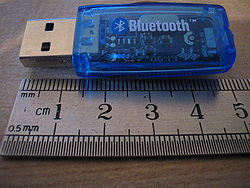Computer requirements

A personal computer that does not have embedded Bluetooth can use a Bluetooth adapter that enables the PC to communicate with Bluetooth devices. While some desktop computers and most recent laptops come with a built-in Bluetooth radio, others require an external adapter, typically in the form of a small USB "dongle."
Unlike its predecessor, IrDA, which requires a separate adapter for each device, Bluetooth lets multiple devices communicate with a computer over a single adapter.
Operating system implementationedit
For Microsoft platforms, Windows XP Service Pack 2 and SP3 releases work natively with Bluetooth v1.1, v2.0 and v2.0+EDR. Previous versions required users to install their Bluetooth adapter's own drivers, which were not directly supported by Microsoft. Microsoft's own Bluetooth dongles (packaged with their Bluetooth computer devices) have no external drivers and thus require at least Windows XP Service Pack 2. Windows Vista RTM/SP1 with the Feature Pack for Wireless or Windows Vista SP2 work with Bluetooth v2.1+EDR. Windows 7 works with Bluetooth v2.1+EDR and Extended Inquiry Response (EIR). The Windows XP and Windows Vista/Windows 7 Bluetooth stacks support the following Bluetooth profiles natively: PAN, SPP, DUN, HID, HCRP. The Windows XP stack can be replaced by a third party stack that supports more profiles or newer Bluetooth versions. The Windows Vista/Windows 7 Bluetooth stack supports vendor-supplied additional profiles without requiring that the Microsoft stack be replaced. It is generally recommended to install the latest vendor driver and its associated stack to be able to use the Bluetooth device at its fullest extent.
Apple products have worked with Bluetooth since Mac OS X v10.2, which was released in 2002.
Linux has two popular Bluetooth stacks, BlueZ and Fluoride. The BlueZ stack is included with most Linux kernels and was originally developed by Qualcomm. Fluoride, earlier known as Bluedroid is included in Android OS and was originally developed by Broadcom. There is also Affix stack, developed by Nokia. It was once popular, but has not been updated since 2005.
FreeBSD has included Bluetooth since its v5.0 release, implemented through netgraph.
NetBSD has included Bluetooth since its v4.0 release. Its Bluetooth stack was ported to OpenBSD as well, however OpenBSD later removed it as unmaintained.
DragonFly BSD has had NetBSD's Bluetooth implementation since 1.11 (2008). A netgraph-based implementation from FreeBSD has also been available in the tree, possibly disabled until 2014-11-15, and may require more work.
Comments
Post a Comment